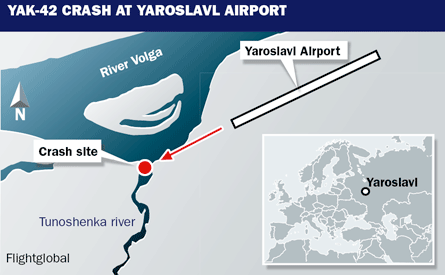Medvedev demands 'radical' aviation reform after Yak crash

Russian president Dmitry Medvedev underlined a need to cut the number of carriers operating in the country in the wake of another fatal accident, after a chartered Yakovlev Yak-42 crashed on departure from Yaroslavl.
Keep reading this article by becoming a FlightGlobal member now
PLEASE REGISTER FOR FREE OR SIGN IN TO CONTINUE READING

You have reached your limit of free articles for this period. Register for a FREE account to read this article and benefit from:
- Increased access to online news and in-depth articles from:
- FlightGlobal Premium covering the global aviation industry
- Airline Business providing insight for business leaders
- Weekly newsletters on topics across the industry
